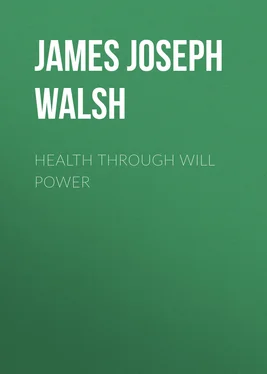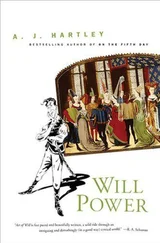James Walsh - Health Through Will Power
Здесь есть возможность читать онлайн «James Walsh - Health Through Will Power» — ознакомительный отрывок электронной книги совершенно бесплатно, а после прочтения отрывка купить полную версию. В некоторых случаях можно слушать аудио, скачать через торрент в формате fb2 и присутствует краткое содержание. Жанр: foreign_prose, psy_theraphy, foreign_edu, foreign_antique, на английском языке. Описание произведения, (предисловие) а так же отзывы посетителей доступны на портале библиотеки ЛибКат.
- Название:Health Through Will Power
- Автор:
- Жанр:
- Год:неизвестен
- ISBN:нет данных
- Рейтинг книги:5 / 5. Голосов: 1
-
Избранное:Добавить в избранное
- Отзывы:
-
Ваша оценка:
- 100
- 1
- 2
- 3
- 4
- 5
Health Through Will Power: краткое содержание, описание и аннотация
Предлагаем к чтению аннотацию, описание, краткое содержание или предисловие (зависит от того, что написал сам автор книги «Health Through Will Power»). Если вы не нашли необходимую информацию о книге — напишите в комментариях, мы постараемся отыскать её.
Health Through Will Power — читать онлайн ознакомительный отрывок
Ниже представлен текст книги, разбитый по страницам. Система сохранения места последней прочитанной страницы, позволяет с удобством читать онлайн бесплатно книгу «Health Through Will Power», без необходимости каждый раз заново искать на чём Вы остановились. Поставьте закладку, и сможете в любой момент перейти на страницу, на которой закончили чтение.
Интервал:
Закладка:
All these various dreads, then, have the definite effect of lessening the power of the will to enable people to do their work and remain well. They represent serious brakes upon the flow of nerve impulses from the spiritual side of man's nature to the physical. This is much more serious in its results than would usually be thought; and one of the things that a physician has to find out from a great many patients is what sources of dread they are laboring under so as to neutralize them or at least correct them as far as possible. It is surprising how much good can be accomplished by a deliberate quest after dreads and the direct discussion of them, for they are always much less significant when brought out of the purlieus of the mind directly into the open. Many a neurotic patient, particularly, will not be improved until his dreads are relieved. This form of psycho-analysis rather than the search for sex insults, as they are called, or sexual incidents of early life, is the hopeful phase of modern psychological contribution to therapeutics.
CHAPTER III
HABITS
"Why, will shall break it; will and nothing else."
Dreads are brakes on the will, inhibitions which prevent its exercise and make accomplishment very difficult and sometimes impossible. They represent mainly a state of mind, yet often they contain physical elements, and the disposition counts for much. Their counterpart in the opposite direction is represented by habits which are acquired facilities of action for good or for ill. Habits not only make activities easy but they even produce such a definite tendency to the performance of certain actions as to make it difficult not to do them. They may become so strong as to be tyrants for ill, though it must not be forgotten that properly directed they may master what is worst in us and help us up the hill of life. Acts that are entirely voluntary and very difficult at first may become by habit so natural that it is extremely difficult to do otherwise than follow the ingrained tendency. Nature's activities are imperative. Habitual actions may become equally so. When some one once remarked to the Duke of Wellington that habit was second nature, he replied:
"Oh, ever so much more than that! Habit may be ten times as strong as nature."
The function of the will in health is mainly to prevent the formation of bad habits or break those that have been formed, but above all, to bring about the formation of habits that will prevent as far as is possible the development of tendencies to disease in the body, Man probably faces no more difficult problem in life than the breaking of a bad habit. Usually it requires the exercise of all his will power applied to its fullest extent. If there is a more difficult problem than the breaking of a bad habit it is the formation of a good one late in life because of the persistency of advertence and effort that is required. It is comparatively easy to prevent the formation of bad habits and also easy to form good habits in the earlier years. The organism is then plastic and yields itself readily and thus becomes grooved to the habit or hardened against it by the performance of even a few acts.
All the psychologists insist that after the period of the exercise of instinct as the basis of life passes, habit becomes the great force for good or for ill. We become quite literally a bundle of habits, and the success of life largely depends on whether these habits are favorable or unfavorable to the accomplishment of what is best in us. More than anything else health depends on habit. We begin by doing things more or less casually, and after a time a tendency to do them is created; then almost before we know it, we find that we have a difficult task before us, if we try not to do them.
To begin with, the activity which becomes the subject of a habit may be distinctly unpleasant and require considerable effort to accomplish. Practically every one who has learned to smoke recalls more or less vividly the physical disturbance caused by the first attempt and how even succeeding smokes for some time, far from being pleasant, required distinct effort and no little self-control. After a time, the desire to smoke becomes so ingrained that a man is literally made quite miserable by the lack of it and finds himself almost incapable of doing anything else until he has had his smoke.
Even more of an effort is required to establish the habit of chewing tobacco, and it is even more difficult to break when once it has been formed. Any one who has seen the discomfort and even torments endured by a man who, after he had chewed tobacco for many years, tried to stop will appreciate fully what a firm hold the habit has obtained. I have known a serious business man who almost had to give up business, who lost his sleep and his appetite and went through a nervous crisis merely by trying to break the habit of chewing tobacco.
In the Orient they chew betel nut. It is an extremely hot material which burns the tongue and which a man can stand for only a very short time when he first tries it. After a while, however, he finds a pleasant stimulation of sensation in the constant presence of the biting betel nut in his mouth; he craves it and cannot do his work so well without it. He will ever advert to its use and will be restless without it. He continues to use it in spite of the fact that the intense irritation set up by the biting qualities of the substance causes cancer of the tongue to occur ten times as frequently among those who chew betel nut as among the rest of the population. Not all those who chew it get cancer, for some die from other causes before there is time for the cancer to develop, and some seem to possess immunity against the irritation. The betel nut chewer ignores all this, proceeds to form the habit, urged thereto by the force of example, and then lets himself drift along, hoping that it will have no bad effects.
The alcohol and drug habits are quite as significant in shortening life as betel nut and yet men take them up quite confident in the beginning that they will not fall victims, and then find themselves enmeshed. It is probable that the direct physical effects of none of these substances shorten life to a marked degree unless they are indulged in to very great excess, but the moral hazards which they produce, accidents, injuries of various kinds, exposure to disease, all these shorten life. Men know this very well, and yet persist in the formation of these habits.
Any habit, no matter how strong, can be broken if the individual really wishes to break it, provided the subject of it is not actually insane or on the way to the insane asylum. He need only get a motive strong enough to rouse his will, secure a consciousness of his own power, and then the habit can be broken. After all, it must never be forgotten that the only thing necessary in order to break a habit effectively is to refuse to perform a single act of it, the next time one is tempted. That breaks the habit and makes refusal easier and one need only continue the refusal until the temptation ceases.
Men who have not drawn a sober breath for years have sometimes come to the realization of the fools that they were making of themselves, the injury they were doing their relatives, or perhaps have been touched by a child's words or some religious motive, and after that they have never touched liquor again. Father Theobald Mathew's wonderful work in this regard among the Irish in the first half of the nineteenth century has been repeated by many temperance or total abstinence advocates in more recent generations. I have known a confirmed drunkard reason himself into a state of mind from which he was able to overcome his habit very successfully, though his reasoning consisted of nothing more than the recognition of the fact that suggestion was the root of his craving for alcohol. His father had been a drunkard and he had received so many warnings from all his older relatives and had himself so come to dwell on the possible danger of his own formation of the habit that he had suggested himself into the frame of mind in which he took to drink. I have known a physician on whom some half a dozen different morphine cures had been tried—always followed by a relapse—cure himself by an act of his own will and stay cured ever since because of an incident that stirred him deeply enough to arouse his will properly to activity. One day his little boy of about four was in his office when father prepared to give himself one of his usual injections of morphine. The little boy gave very close attention to all his father's manipulations, and as the doctor was hurrying to keep an appointment, he did not notice the intent eye witness of the proceedings. Just as the needle was pushed home and the piston shot down in the barrel, the little boy rushed over to his father and said, "Oh, Daddy, do that to me." Apparently this close childish observer had noted something of the look of satisfaction that came over his father's face as he felt the fluid sink into his tissues. It is almost needless to say that the shock the father received was enough to break his morphine habit for good and all. It simply released his will and then he found that if he really wanted to, he could accomplish what the various cures for the morphine habit only lead up to—and in his case unsuccessfully—the exercise of his own will power.
Читать дальшеИнтервал:
Закладка:
Похожие книги на «Health Through Will Power»
Представляем Вашему вниманию похожие книги на «Health Through Will Power» списком для выбора. Мы отобрали схожую по названию и смыслу литературу в надежде предоставить читателям больше вариантов отыскать новые, интересные, ещё непрочитанные произведения.
Обсуждение, отзывы о книге «Health Through Will Power» и просто собственные мнения читателей. Оставьте ваши комментарии, напишите, что Вы думаете о произведении, его смысле или главных героях. Укажите что конкретно понравилось, а что нет, и почему Вы так считаете.












